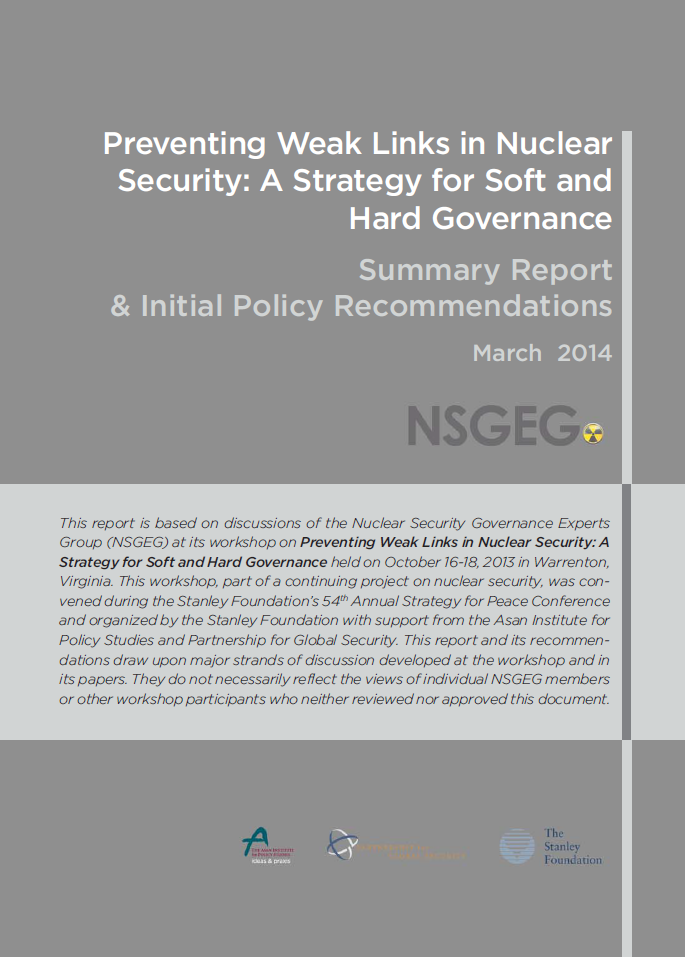This report is based on discussions of the Nuclear Security Governance Experts Group (NSGEG), which was established jointly by The Asan Institute for Policy Studies, the Stanley Foundation, and the Partnership for Global Security (PGS) in 2012, at its workshop on “Preventing Weak Links in Nuclear Security: A Strategy for Soft and Hard Governance” held on October 16-18, 2013 in Warrenton, Virginia.
Responsibility Beyond Rules: Leadership for a Secure Nuclear Future
March 2014
Executive Summary
The current nuclear security regime is not robust, adaptable, or coherent enough to adequately protect against the intensifying and evolving threats posed by nuclear terrorism in the 21st century. The governance system for nuclear security is in need of significant improvement in three areas: greater coherence and confirmed effectiveness, enhanced transparency, and increased international confidence, including through shared assessments of performance and cooperation.
The current nuclear security regime has improved over time, but this evolution has been too slow and is incomplete. It relies primarily on opaque national structures and voluntary commitments to prevent nuclear and radiological terrorism. While there are a limited number of binding international agreements covering aspects of nuclear security, adherence to them is incomplete, assessing compliance is difficult, and they leave significant gaps in the system.
The Nuclear Security Summit (NSS) process raised the profile of nuclear security and initiated a dialogue among more than 50 heads of state and international organizations. However, the primary focus of the first two summits in Washington (2010) and Seoul (2012) was on effective implementation of the current regime, rather than identifying and addressing its shortcomings and building a sustainable global regime for the future. The third summit, taking place in the Netherlands in 2014, offers leaders an opportunity to demonstrate global leadership and responsibility beyond today’s rules and regulations by endorsing improvements to the international nuclear security system that emphasize confirmed performance and accountability. The governance structures of the current regime cannot be reformed overnight, but the process must be initiated by 2014.
This document details five steps and 30 recommendations for significantly strengthening the global nuclear security regime and creating the foundation for its long-term effectiveness and adaptability. These steps and the recommendations result from three international workshops held by the Nuclear Security Governance Experts Group (NSGEG) in 2012. The goal is to enable substantial nuclear security regime improvements by 2020.
The five steps forward are:
- Defining the scope of nuclear security
- Universalizing the current regime
- Adopting the principle of continuous improvement
- Addressing political challenges
- Creating a unifying instrument
The recommendations fall under one of three categories. They offer a range of concrete actions that nuclear security policymakers, regulators, industry representatives, international organization officials, and nongovernmental experts can pursue together to advance global nuclear security governance. Many recommendations are directed specifically at the organizers and participants of the 2014 NSS, but the scope of the NSGEG’s work is not limited to that event or to those participants.
The three categories of recommendations are:
- Improving regime cohesion
- Promoting greater transparency
- Building international confidence
The NSGEG plans to use this document to advocate for measures that will strengthen nuclear security in the long term, while promoting the specific, near- and medium-term steps necessary to begin this process of improvement. The 2014 NSS will be a success if countries commit to sustaining high-level political attention to this issue, agree on the importance of greater information sharing to improve nuclear security, and formally recognize the need for a unifying instrument for the global nuclear security regime to be followed by a process to develop and negotiate a framework agreement for nuclear security with the goal of entry into force by 2020.
To download the report, please click the link above.

 Facebook
Facebook Twitter
Twitter